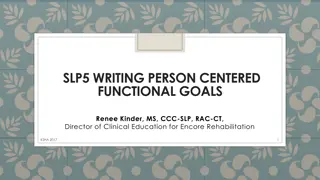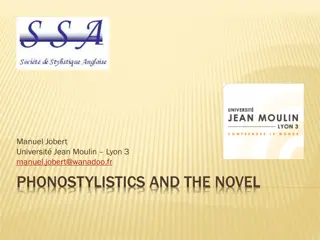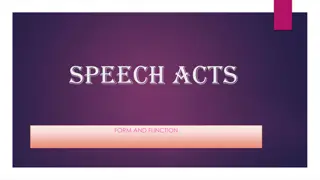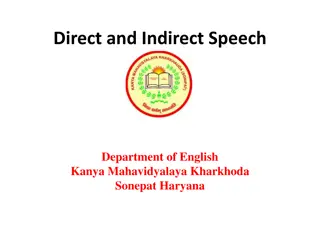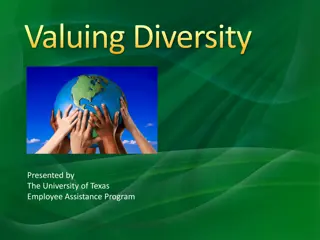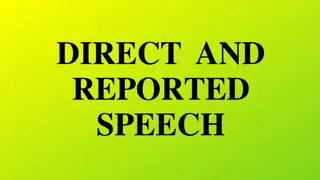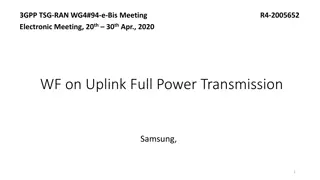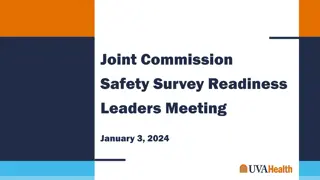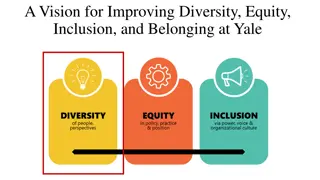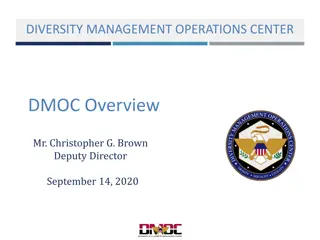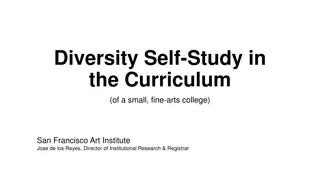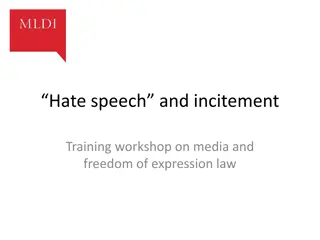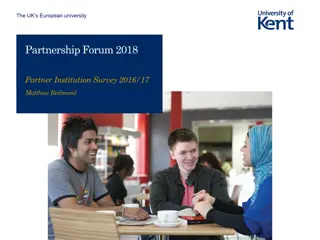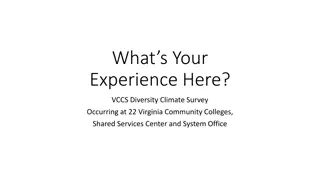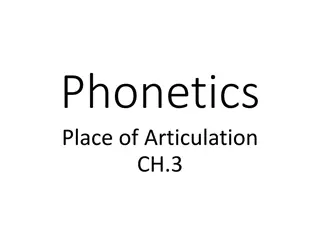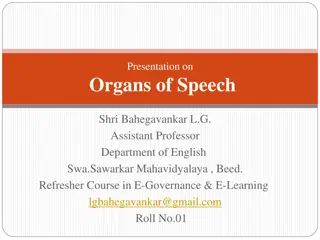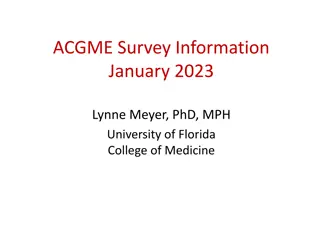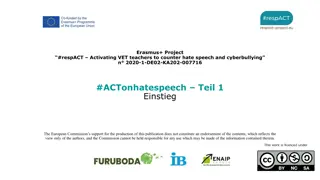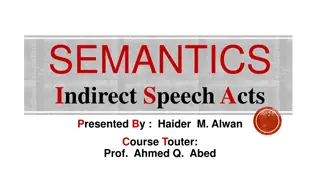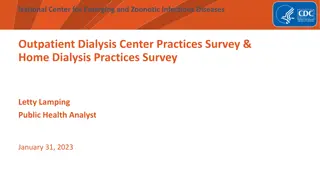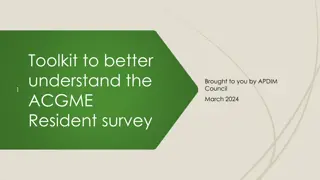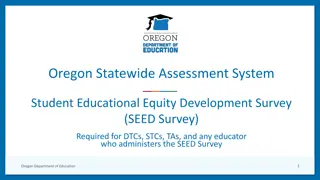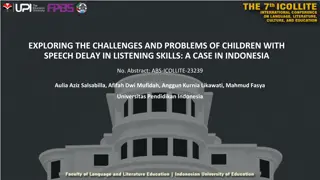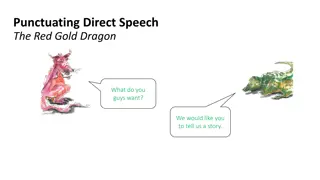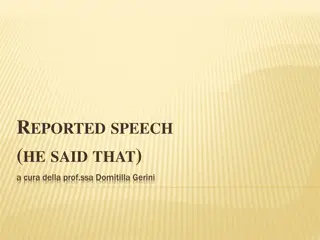Yale Undergraduate Survey on Free Speech and Intellectual Diversity
A survey conducted among 872 Yale undergraduate students in April 2017 by McLaughlin & Associates aimed to gauge opinions on Yale's efforts in promoting intellectual diversity and free speech. Results show varying levels of approval/disapproval across different demographics, including class standing, academic disciplines, political affiliations, race/ethnicity, and gender.
Download Presentation

Please find below an Image/Link to download the presentation.
The content on the website is provided AS IS for your information and personal use only. It may not be sold, licensed, or shared on other websites without obtaining consent from the author. Download presentation by click this link. If you encounter any issues during the download, it is possible that the publisher has removed the file from their server.
E N D
Presentation Transcript
Yale Undergraduate Survey Sponsored By: The William F. Buckley, Jr. Program at Yale April 25th, 2017 Presented by: Jim McLaughlin and Rob Schmidt www.mclaughlinonline.com
Methodology McLaughlin & Associates conducted a survey of 872 Yale undergraduate students from April 17th to 23rd, 2017. All interviews were conducted online and students were contacted through email and promoted Facebook postings where they were provided a hyperlink to a secure survey platform. Only students who provided a verified Yale email address had their responses counted. To encourage participation, students were offered a $5 gift card of their choice upon successful completion of the survey. Data for this survey have been stratified by age, race/ethnicity and gender using the 2015-2016 Yale Facts and Statistics Report to reflect the actual demographic composition of Yale undergraduate students. Because the sample is based on those who initially self-selected for participation rather than a probability sample, no estimates of sampling error can be calculated. All surveys may be subject to multiple sources of error, including, but not limited to sampling error, coverage error and measurement error. However, a confidence interval of 95% was calculated in order to produce an error estimate of +/- 3.3% for the 872 respondents. This error estimate should be taken into consideration in much the same way that analysis of probability polls takes into account the margin of sampling error. The error estimate increases for cross-tabulations. Totals may not add up to exactly 100% due to rounding and refusals. Yale Undergraduate April 2017 2
Part One General Opinions on Free Speech and Intellectual Diversity at Yale Yale Undergraduate April 2017 3
Appr Disapr Generally speaking, do you approve or disapprove of the job that Yale is doing when it comes to promoting intellectual diversity and differing opinions in the classroom and on campus? Freshman 58 36 Sophomore 58 35 Junior 50 44 Senior 55 38 Social Sciences 53 42 Humanities 55 39 Physical Sciences 52 37 80 Engineering 54 35 70 Republican 32 67 56 Democrat 67 26 60 Independent 48 46 50 44 Liberal 70 23 38 Moderate 47 46 40 Conservative 30 66 25 30 White 52 42 20 Hispanic 52 39 12 11 Black 55 35 7 10 Asian 63 28 0 Male 48 45 APPR. Strongly Smwt. DISAPR. Smwt. Strongly DK/REF. Female 63 31 Yale Undergraduate April 2017 White Liberal 70 23 4 Non-White Liberal 69 24
Appr Disapr And generally speaking, do you approve or disapprove of the job that Yale is doing when it comes to promoting free speech in the classroom and on campus? Freshman 62 33 Sophomore 60 33 Junior 54 41 Senior 63 31 Social Sciences 56 38 Humanities 57 35 Physical Sciences 63 33 80 Engineering 60 32 70 Republican 28 70 60 Democrat 75 20 60 Independent 52 43 50 43 Liberal 76 17 Moderate 51 44 40 34 Conservative 31 66 25 30 White 55 40 17 20 Hispanic 61 36 10 Black 61 33 6 10 Asian 68 23 0 Male 53 42 APPR. Strongly Smwt. DISAPR. Smwt. Strongly DK/REF. Female 67 27 Yale Undergraduate April 2017 White Liberal 74 19 5 Non-White Liberal 77 15
Favor Opp. Would you say you favor or oppose Yale having speech codes to regulate speech for students and faculty? Freshman 17 72 Sophomore 13 74 Junior 15 75 Senior 20 64 Social Sciences 14 73 Humanities 19 70 Physical Sciences 15 74 80 72 Engineering 11 78 70 Republican 10 81 Democrat 18 68 60 Independent 14 75 50 42 Liberal 20 65 Moderate 10 80 40 29 Conservative 9 83 30 White 13 77 16 20 Hispanic 15 69 13 13 Black 24 61 10 2 Asian 19 68 0 Male 13 79 FAVOR Strongly Smwt. OPPOSE Smwt. Strongly DK/REF. Female 18 65 Yale Undergraduate April 2017 White Liberal 13 76 6 Non-White Liberal 25 57
Div. Forbid Which of the following statements comes closer to your own personal opinion? Freshman 88 4 Sophomore 83 3 Junior 85 5 Yale should always do its best to promote intellectual diversity and free speech by allowing a wide range of people with differing views and opinions to speak on campus OR Yale should forbid people from speaking on campus who have controversial views and opinions on issues like politics, race, religion or gender 84 Senior 79 10 Social Sciences 85 5 Humanities 83 7 Physical Sciences 86 4 Engineering 88 3 Republican 95 1 90 Democrat 79 6 80 Independent 80 4 70 Liberal 77 7 60 Moderate 94 2 50 Conservative 97 1 40 White 86 4 30 Hispanic 79 9 20 11 Black 81 4 5 10 Asian 87 2 0 Male 88 5 Promote Diversity Forbid People DK/Ref. Female 82 5 Yale Undergraduate April 2017 White Liberal 77 7 7 Non-White Liberal 77 7
Agree Disagr Freshman 87 8 Do you agree or disagree with the following statement? Sophomore 85 9 Yale must do everything possible to ensure within it the fullest degree of intellectual freedom We take a chance, as the First Amendment takes a chance, when we commit ourselves to the idea that the results of free expression are to the general benefit in the long run, however unpleasant they may appear at the time. Junior 88 8 Senior 81 15 Social Sciences 84 10 Humanities 84 11 Physical Sciences 88 8 Engineering 89 8 Republican 96 3 85 90 Democrat 80 12 80 Independent 91 5 70 Liberal 79 14 60 Moderate 94 4 46 50 39 Conservative 96 3 40 White 88 7 30 Hispanic 80 16 20 10 Black 84 12 8 5 2 10 Asian 87 7 0 Male 90 6 AGREE Strong. Smwt. DISAGREE Smwt. Strong. DK/REF. Female 81 13 Yale Undergraduate April 2017 White Liberal 82 10 8 Non-White Liberal 76 17
Part Two Perceptions of the Academic Environment on Free Speech and Intellectual Diversity Yale Undergraduate April 2017 9
Comf. Not C. How comfortable do you feel about voicing your opinions in the classroom and on campus on issues such as politics, race, religion and gender? Freshman 61 38 Sophomore 56 42 Junior 49 49 Senior 30 38 Social Sciences 57 41 Humanities 61 38 Physical Sciences 52 47 Engineering 51 48 80 Republican 24 75 70 Democrat 70 28 57 60 Independent 53 46 Liberal 74 24 50 42 Moderate 45 54 37 40 32 Conservative 27 71 30 White 57 42 20 Hispanic 60 39 20 10 Black 61 39 10 2 Asian 57 41 0 Male 53 46 COMFORT. Very Smwt. NOT COM. Not Not At All DK/REF. Female 61 38 Yale Undergraduate April 2017 White Liberal 77 22 10 Non-White Liberal 72 26
Often Not Of Freshman 67 28 Have you had any experiences with political bias in the classroom, either from students, professors or teaching fellows? Sophomore 70 28 Junior 75 22 Senior 71 25 Social Sciences 74 23 Humanities 70 27 Physical Sciences 67 28 Engineering 67 28 80 70 Republican 88 11 70 Democrat 64 33 60 Independent 74 22 Liberal 64 32 44 50 Moderate 74 24 40 Conservative 84 14 26 26 30 White 73 24 17 Hispanic 75 19 20 9 Black 65 33 4 10 Asian 65 30 0 Male 71 25 OFTEN Freq. Sometimes NOT OFT. Rarely Never DK/REF. Female 71 26 Yale Undergraduate April 2017 White Liberal 65 33 11 Non-White Liberal 64 31
Often Not Of Have you felt intimidated to share your ideas, opinions or beliefs in class because they were different than those of your professors and teaching fellows? Freshman 44 53 Sophomore 48 50 Junior 49 50 Senior 41 57 Social Sciences 51 48 Humanities 46 53 Physical Sciences 40 57 Engineering 40 57 80 Republican 83 17 70 Democrat 31 67 60 Independent 51 46 52 Liberal 26 71 45 50 Moderate 62 37 35 40 31 Conservative 76 22 30 White 45 53 22 Hispanic 47 52 20 10 Black 40 53 10 2 Asian 43 55 0 Male 47 52 OFTEN Freq. Sometimes NOT OFT. Rarely Never DK/REF. Female 44 53 Yale Undergraduate April 2017 White Liberal 22 76 12 Non-White Liberal 31 67
Often Not Of And have you felt intimidated to share your ideas, opinions or beliefs in class because they were different than those of your classmates or peers? Freshman 52 46 Sophomore 57 41 Junior 62 37 Senior 48 51 Social Sciences 58 40 Humanities 52 48 Physical Sciences 56 42 Engineering 53 45 80 Republican 80 20 70 Democrat 41 58 55 60 Independent 65 33 Liberal 38 60 44 50 39 Moderate 70 29 40 Conservative 81 18 27 30 White 54 45 16 Hispanic 63 37 15 20 Black 55 41 10 2 Asian 55 43 0 Male 56 43 OFTEN Freq. Sometimes NOT OFT. Rarely Never DK/REF. Female 54 44 Yale Undergraduate April 2017 White Liberal 31 67 13 Non-White Liberal 45 54
Often Not Of Freshman 15 80 Have you been treated unfairly on campus by either fellow students or professors as a result of your political opinions and beliefs? Sophomore 15 80 Junior 18 76 Senior 19 78 Social Sciences 22 74 Humanities 14 80 Physical Sciences 14 82 Engineering 13 81 78 80 Republican 47 43 70 Democrat 7 91 54 60 Independent 16 76 Liberal 8 89 50 Moderate 15 81 40 Conservative 39 51 25 30 White 17 78 17 Hispanic 17 79 20 13 Black 25 71 5 4 10 Asian 12 84 0 Male 19 76 OFTEN Freq. Sometimes NOT OFT. Rarely Never DK/REF. Female 13 82 Yale Undergraduate April 2017 White Liberal 5 91 14 Non-White Liberal 10 87
Often Not Of Have you felt intimidated to write a paper espousing your own ideas, opinions or beliefs because they were different than your professors and teaching fellows and would result in a bad grade? Freshman 22 71 Sophomore 28 69 Junior 23 72 Senior 23 74 Social Sciences 29 67 Humanities 22 74 Physical Sciences 13 80 Engineering 22 74 80 71 Republican 61 36 70 Democrat 12 84 60 Independent 28 69 51 Liberal 11 85 50 Moderate 25 70 40 Conservative 55 41 24 30 White 24 73 20 17 Hispanic 24 74 20 Black 29 72 7 5 10 Asian 19 72 0 Male 30 67 OFTEN Freq. Sometimes NOT OFT. Rarely Never DK/REF. Female 18 76 Yale Undergraduate April 2017 White Liberal 7 90 15 Non-White Liberal 14 81
Often Not Of Have you had any professors that have used class time to express their own social or political beliefs that are completely unrelated to the subject of the course? Freshman 28 70 Sophomore 35 64 Junior 33 66 Senior 32 68 Social Sciences 33 66 Humanities 35 64 Physical Sciences 27 71 Engineering 31 68 80 Republican 61 38 67 70 Democrat 24 75 60 Independent 33 65 Liberal 23 75 50 Moderate 32 67 34 40 33 32 Conservative 51 47 24 30 White 34 65 Hispanic 33 66 20 Black 25 75 7 10 2 Asian 22 75 0 Male 35 64 OFTEN Freq. Sometimes NOT OFT. Rarely Never DK/REF. Female 28 70 Yale Undergraduate April 2017 White Liberal 25 75 16 Non-White Liberal 22 76
Often Not Of And have you had any teaching fellows that have used class time to express their own social or political beliefs that are completely unrelated to the subject of the course? Freshman 14 80 Sophomore 28 70 Junior 20 77 Senior 18 80 Social Sciences 24 72 Humanities 19 77 Physical Sciences 16 81 Engineering 15 82 77 80 Republican 48 52 70 Democrat 14 84 60 Independent 19 75 51 Liberal 13 84 50 Moderate 18 79 40 Conservative 38 59 25 30 White 21 76 20 16 Hispanic 19 78 20 Black 30 66 5 10 3 Asian 13 81 0 Male 24 74 OFTEN Freq. Sometimes NOT OFT. Rarely Never DK/REF. Female 15 81 Yale Undergraduate April 2017 White Liberal 11 86 17 Non-White Liberal 15 81
Lib Mod Cons Freshman 85 8 2 Generally speaking, when it comes to the political ideology of your professors, would you say most of them are ? Sophomore 87 6 2 Junior 92 4 1 Senior 91 6 0 Social Sciences 88 7 2 Humanities 90 5 2 Physical Sci. 91 6 0 Engineering 90 4 1 100 88 Republican 94 2 4 90 Democrat 90 6 0 80 Independent 88 7 0 62 70 Liberal 90 6 0 60 Moderate 86 9 0 50 Conservative 90 3 4 40 White 91 4 1 27 30 Hispanic 86 7 2 20 Black 76 20 2 6 5 10 1 1 Asian 85 8 0 0.4 0 Male 89 6 1 LIBERAL Very Smwt. MOD. CONS. Smwt. Very DK/REF. Female 88 6 1 Yale Undergraduate April 2017 White Lib. 94 3 0 18 Non-White Lib. 86 8 0
Toler. More Which of the following comes closer to your own opinion? Freshman 71 24 Sophomore 70 23 My professors are generally tolerant of diverse opinions in the classroom and encourage open debate and exposure to a wide range of views. OR My professors should be doing more to promote intellectual diversity, encourage open debate and reduce political bias in the classroom. Junior 70 23 Senior 68 27 Social Sciences 67 29 Humanities 73 23 Physical Sciences 71 18 Engineering 71 22 Republican 35 61 80 70 Democrat 84 11 70 Independent 61 29 60 Liberal 84 12 50 Moderate 68 25 Conservative 40 52 40 24 White 67 28 30 Hispanic 73 22 20 Black 68 21 6 10 Asian 77 18 0 Male 66 28 Tolerant Doing More DK/Ref. Female 74 20 Yale Undergraduate April 2017 White Liberal 84 11 19 Non-White Liberal 82 13
Part Three Renaming Calhoun College Yale Undergraduate April 2017 20
Favor Opp. Switching topics now, do you favor or oppose the school s decision to rename Calhoun College? Freshman 67 26 Sophomore 63 31 Junior 66 27 Senior 71 22 Social Sciences 60 33 Humanities 64 29 Physical Sciences 69 24 80 Engineering 73 21 67 70 Republican 28 63 Democrat 84 12 60 Independent 57 35 50 Liberal 87 10 40 Moderate 54 33 40 Conservative 31 61 27 27 30 White 62 32 18 20 Hispanic 67 20 9 Black 79 20 7 10 Asian 77 17 0 Male 59 33 FAVOR Strongly Smwt. OPPOSE Smwt. Strongly DK/REF. Female 74 20 Yale Undergraduate April 2017 White Liberal 86 11 21 Non-White Liberal 87 9
Right Not On the decision to rename Calhoun College, which of the following statements comes closer to your own personal opinion? Freshman 54 29 Sophomore 50 35 Junior 59 29 Senior 63 23 Yale did the RIGHT THING by renaming Calhoun College because John Calhoun was a white supremacist and defender of slavery. Being associated with these kinds of beliefs reflects poorly on the school and does not represent its values. OR While John Calhoun s beliefs are offensive, Yale SHOULD NOT have renamed Calhoun College. This is a matter of the school s tradition and there may be others that held similar views, which opens the door to changing more of Yale s history in an effort to be politically correct. Social Sciences 50 37 Humanities 57 28 Physical Sciences 57 27 Engineering 59 24 Republican 18 70 Democrat 74 14 Independent 46 34 Liberal 78 11 80 Moderate 38 39 56 Conservative 18 66 60 White 53 33 29 40 Hispanic 55 21 15 Black 73 21 20 Asian 60 24 0 Male 50 33 Right Thing Should Not Have DK/Ref. Female 62 25 Yale Undergraduate April 2017 White Liberal 78 11 22 Non-White Liberal 78 11
M/S NM/N Freshman 13 63 In your opinion, are there additional buildings, titles, programs or other entities on campus that should be renamed? Sophomore 15 61 Junior 13 62 Senior 11 66 Social Sciences 13 67 Humanities 13 66 Physical Sciences 14 62 Engineering 10 58 80 Republican 4 88 63 70 Democrat 19 54 60 Independent 8 70 Liberal 20 48 50 39 Moderate 4 78 40 Conservative 4 84 24 24 30 White 9 71 13 20 Hispanic 11 58 10 Black 34 47 3 10 Asian 17 51 0 Male 9 70 MANY/ SOME Many Several NOT M/ NONE Not Many None DK/REF. Female 16 56 Yale Undergraduate April 2017 White Liberal 14 59 23 Non-White Liberal 25 39
Awar Unawr Are you aware or unaware that Elihu Yale was a slave trader? Freshman 70 25 Sophomore 89 8 Junior 73 21 Senior 83 16 Social Sciences 80 17 Humanities 87 11 90 Physical Sciences 76 20 79 80 Engineering 73 21 Republican 86 13 70 Democrat 80 16 60 Independent 80 17 50 Liberal 77 18 Moderate 79 17 40 Conservative 82 15 30 White 82 16 18 20 Hispanic 80 15 Black 79 14 4 10 Asian 69 26 0 Male 82 15 Aware Unaware DK/Ref. Female 75 20 Yale Undergraduate April 2017 White Liberal 81 15 24 Non-White Liberal 75 20
Favor Opp. Knowing this to be true that Elihu Yale was a slave trader, would you favor or oppose renaming Yale itself? Freshman 5 82 Sophomore 9 84 Junior 8 87 Senior 10 82 Social Sciences 7 84 Humanities 7 87 Physical Sciences 10 83 84 90 Engineering 8 79 80 Republican 3 94 64 70 Democrat 11 78 Independent 5 89 60 Liberal 11 77 50 Moderate 1 93 40 Conservative 3 94 White 6 87 30 19 Hispanic 6 86 20 9 Black 18 74 8 6 10 2 Asian 8 76 0 Male 7 88 FAVOR Strongly Smwt. OPPOSE Smwt. Strongly DK/REF. Female 7 81 Yale Undergraduate April 2017 White Liberal 10 82 25 Non-White Liberal 11 74
Pos. Neg. Freshman 32 20 Are you familiar with the William F. Buckley, Jr. Program? Sophomore 24 22 Junior 32 23 Senior 25 28 Social Sciences 36 21 Humanities 33 26 Physical Sciences 23 23 50 Engineering 27 15 45 Republican 67 2 40 Democrat 16 34 32 35 Independent 33 16 29 30 Liberal 12 34 23 Moderate 34 13 25 Conservative 60 3 20 16 White 35 21 15 Hispanic 26 28 10 Black 17 32 5 1 Asian 18 18 0 Male 39 16 Positive Negative No Opinion Not Familiar Unsure Female 18 29 Yale Undergraduate April 2017 White Liberal 18 34 26 Non-White Liberal 8 35
Demographic Summary Major(s)* Tot. Perceived Ideology Tot. Age Tot. Social Sciences 42% Liberal 52% 18 11% Humanities 27% Moderate 21% 19 29% Physical Sciences 18% Conservative 24% 20 28% Engineering 18% Race/Ethnicity* Tot. 21 19% Bio Sciences 13% White 63% 22 13% Undeclared 5% Hispanic 13% Class Tot. Party Affiliation Tot. Black 6% Freshman 29% Republican 14% Asian 23% Sophomore 29% Democrat 44% Other 9% Junior 22% Ind./Unaffiliated 27% Gender Identity Tot. Senior 20% Other Party 1% Male 50% Not Registered 8% Female 48% Yale Undergraduate April 2017 Other *Multiple Responses Accepted 1%
Key Takeaways Part One 1. Yale Undergrads generally approve of how the school is currently handling intellectual diversity and free speech on campus. Students, though, largely oppose speech codes and believe that Yale should still always do its best to promote intellectual diversity and free speech. When it comes to promoting intellectual diversity and differing opinions in the classroom and on campus, 56% approve of the job Yale is doing, while a notable 38% disapprove. Intensity is soft among those who approve, as 44% only somewhat approve compared with just 11% who strongly approve. Democrats approve by a 67% to 26% margin, while Independents are more divided, 48% approve to 46% disapprove. On the other hand, two- thirds, 67%, of Republicans disapprove, while 32% approve. Male students are divided, 48% to 45%, while females approve by a greater than two to one margin, 63% to 31%. Students are more likely to approve of the job Yale is doing when it comes to promoting free speech, 60% approve to 34% disapprove. Intensity is similarly soft among the approvals, as 43% only somewhat approve and 17% strongly approve. Democrats are again strongest in their approval, 75% to 20%, with the majority of Independents also approving, 52% to 43%. By contrast, Republicans disapprove by a higher margin on Yale s promotion of free speech than they do on intellectual diversity, 28% approve to 70% disapprove. By a 72% to 16% margin, students oppose Yale having speech codes to regulate speech for students and faculty. Republicans are most likely to oppose speech codes, 81% (10% favor), as do nearly seven in ten Democrats, 68%, (18% favor). Three in four, 75%, Independents also oppose speech codes (14% favor). By a lopsided 84% to 5% margin, students believe that Yale should always do its best to promote intellectual diversity and free speech rather than forbid people from speaking on campus who have controversial views and opinions. Eleven percent (11%) were unsure. 28
Key Takeaways Part Two 2. Most students have had experiences with political bias in the classroom and there is a sizable amount who have felt intimidated to share differing viewpoints. Importantly, though, many students say they have not been treated unfairly as a result of their political opinions and believe their professors are generally tolerant of diverse opinions. However, the overwhelming majority says their professors are liberal. Almost six in ten, 57%, feel comfortable voicing their opinions in the classroom and on campus on issues such as politics, race, religion and gender. Greater than four in ten, though, 42%, do not feel comfortable voicing their opinions. By party, Republicans and Democrats are the inverse of one another, with 70% of Democrats feeling comfortable (28% uncomfortable) and 75% of Republicans feeling uncomfortable (24% comfortable). Independents are divided, 53% to 46%. By ideology, liberals and conservatives are also opposite, with 74% of liberals feeling comfortable (24% uncomfortable) and 71% of conservative feeling uncomfortable (27% comfortable). Moderates are slightly more likely to feel uncomfortable, 54% to 45%. Female students are more likely than male students to feel comfortable, 61% to 53%, respectively. Seven in ten, 70%, have had experiences with political bias in the classroom often, while 26% say it has not happened often. Republicans are most likely to have experienced political bias often, 88% to 11%. Even two in three Democrats, 64%, and 74% of Independents have also experienced political bias often. When it comes to students having differing opinions with their professors and teaching fellows, 45% say they have often felt intimidated to share their views, while 52% say they have not often felt intimidated. On the other hand, students are more likely to feel intimidated to share their views when it comes to a divergence of opinions with their classmates and peers, 55% often to 44% not often. Nearly eight in ten, 78%, say they have not often been treated unfairly on campus by either fellow students or professors as a result of their political opinions and beliefs. Notably, though, the plurality of Republicans, 47%, and 39% of conservatives say they have often been treated unfairly for their opinions. Greater than seven in ten, 71%, say they have not often felt intimidated to write a paper espousing their own opinions because they were different than their professors and it would result in a bad grade. Again, Republican and conservative students were much more likely to often feel intimidated, 61% and 55%, respectively. Almost nine in ten, 88%, say their professors are liberal. Just 6% say they are moderate and only 1% say they are conservative. By a 70% to 24% margin, students say their professors are generally tolerant of diverse opinions and encourage open debate rather than believing they need to do more to promote diversity and reduce bias in the classroom. 29
Key Takeaways Part Three 3. Students support the decision to rename Calhoun College, but do not think there are additional entities that should be renamed or that Yale itself should be renamed because of Elihu Yale s connections to the slave trade. Two in three, 67%, favor Yale s decision to rename Calhoun College, while 27% oppose it. Democrats favor the renaming by an 84% to 12% margin, while Republicans oppose it, 63% to 28%. Fifty-seven percent (57%) of Independents favor it, while 35% oppose. By ideology, liberals favor 87% to 10%, moderates favor 54% to 33% and conservatives oppose by a two to one margin, 61% to 31%. Female students are more likely then males to favor, 74% to 59%, respectively. By ethnicity, African American and Asian students favor the renaming at the highest levels, 79% and 77%, respectively. When given a choice, 56% of students say Yale did the right thing by renaming Calhoun College because John Calhoun was a defender of slavery and being associated with these kinds of beliefs reflect poorly on the school. Three in ten, 29%, say Yale should not have renamed Calhoun College because it is a matter of the school s tradition and opens the door to changing more of Yale s history to be politically correct. Three in four Democrats, 74%, said Yale did the right thing (14% should not have), while a similar proportion of Republicans, 70%, said Yale should not have renamed Calhoun (18% right thing). By a 46% to 34% margin, Independents say Yale did the right thing. Regarding additional buildings, titles and programs on campus, greater than six in ten, 63%, say there are not many (24%) or any at all (39%) that should be renamed. Just 3% say many should be renamed and 10% say there are several that should be renamed. Almost eight in ten, 79%, are aware that Elihu Yale was a slave trader. Even when taking that into consideration, 84% oppose renaming Yale itself. 30


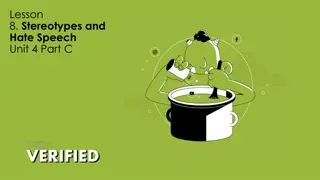

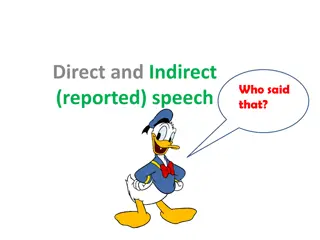

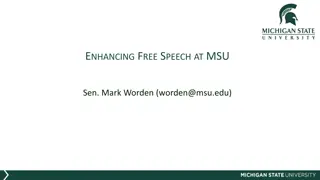
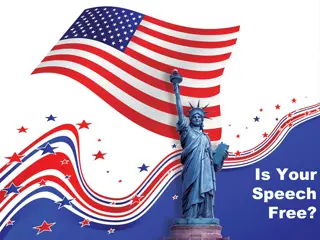


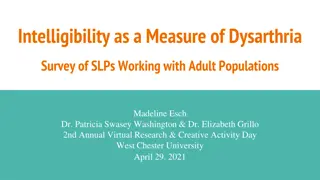

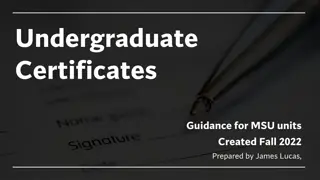
![Prevention and Combating of Hate Crimes and Hate Speech Bill [B.9B.2018]](/thumb/60513/prevention-and-combating-of-hate-crimes-and-hate-speech-bill-b-9b-2018.jpg)
